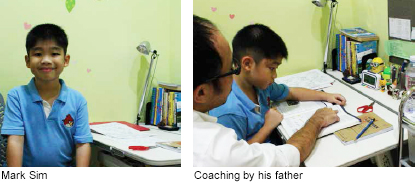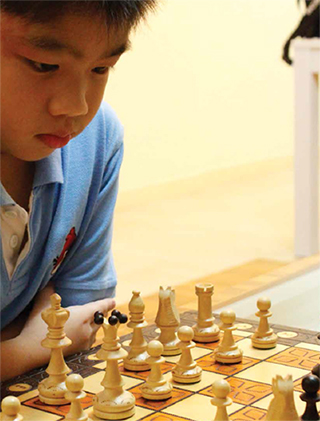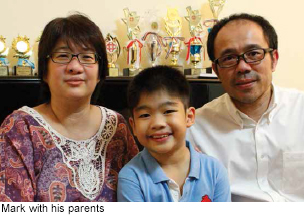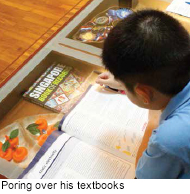 Mark Sim, now 9, looks like a typical young boy as he eagerly turns the pages of his book to find his favourite topics. However, the book in his hands is a thick IGCSE Physics textbook, for an exam mostly taken by 15- or 16-year-old students. The Nanyang Primary School student took the IGCSE Physics exam last year when he was only 8 years old and became the youngest person to score an A grade for that exam. EduNation paid the Sim family a visit in September 2015 to find out more about the experience.
Mark Sim, now 9, looks like a typical young boy as he eagerly turns the pages of his book to find his favourite topics. However, the book in his hands is a thick IGCSE Physics textbook, for an exam mostly taken by 15- or 16-year-old students. The Nanyang Primary School student took the IGCSE Physics exam last year when he was only 8 years old and became the youngest person to score an A grade for that exam. EduNation paid the Sim family a visit in September 2015 to find out more about the experience.
 The soft-spoken boy smiles shyly when asked how he got interested in Physics. He points to a whiteboard on a stand in the living room, and says that his father sketched graphs to explain velocity and acceleration which triggered his fascination with physics. His father, Mr Harry Sim, elaborates that since Mark was interested in cars, he once explained to the boy the difference between their family car and a Ferrari. Surprised that Mark understood the explanation, he continued to teach him more, and finally bought the physics textbook for him. The soft-spoken boy smiles shyly when asked how he got interested in Physics. He points to a whiteboard on a stand in the living room, and says that his father sketched graphs to explain velocity and acceleration which triggered his fascination with physics. His father, Mr Harry Sim, elaborates that since Mark was interested in cars, he once explained to the boy the difference between their family car and a Ferrari. Surprised that Mark understood the explanation, he continued to teach him more, and finally bought the physics textbook for him.
 Mr Sim says that he and his wife, Ju Sing, initially had no intention of signing Mark up to take an exam. However, after Mark had tried a past-year GCE 'O' level Physics exam paper, they decided to let him attempt the exam. To their surprise, they discovered that the Ministry of Education (MOE) does not allow students under the age of 15 years to take GCE 'O' level exams. Instead, they signed Mark up for the IGCSE exam held by the British Council. Although they felt that Mark had understood the material, they were not expecting a high grade given that he was so much younger than the other candidates. So his A grade was a pleasant surprise! Mr Sim says that he and his wife, Ju Sing, initially had no intention of signing Mark up to take an exam. However, after Mark had tried a past-year GCE 'O' level Physics exam paper, they decided to let him attempt the exam. To their surprise, they discovered that the Ministry of Education (MOE) does not allow students under the age of 15 years to take GCE 'O' level exams. Instead, they signed Mark up for the IGCSE exam held by the British Council. Although they felt that Mark had understood the material, they were not expecting a high grade given that he was so much younger than the other candidates. So his A grade was a pleasant surprise!
Besides teaching Mark from the textbook, Mr Sim also bought items such as resistors for him to have some hands-on experience at home. However, because they had no access to a laboratory, they opted for Mark to take a written alternative to the practical exam. For this paper, students are given data and required to plot graphs and answer questions, but do not need to conduct the experiments themselves.
Mark said that he didn't find the work hard, and his father would ask him to rest and take walks rather than study if he was tired. He grins mischievously and says that he did not feel stressed, not even during the exam. In fact, he says he finished one of the papers in 30 minutes, and his main complaint about the exam was that the room was too cold!
 When asked why they chose for Mark to take the Physics rather than the Maths exam, Mr Sim said that since Mark was interested in Physics, and he was able to coach Mark in this subject, they just went along with it. Although Mark was also strong in Maths, they had no intention of signing him up for more than one subject. When asked why they chose for Mark to take the Physics rather than the Maths exam, Mr Sim said that since Mark was interested in Physics, and he was able to coach Mark in this subject, they just went along with it. Although Mark was also strong in Maths, they had no intention of signing him up for more than one subject.
 So what next? Mrs Sim chimed in to say that their main focus for the moment was the Gifted Education Programme selection tests and the school year-end exams. She is in charge of coaching Mark in English and Maths, and encourages him to read more and practise Maths questions. Although Mark enthusiastically showed off his newly-acquired &'A' level Physics textbook, they have made no plans for him to take the 'A' level exam. "Maybe in two years time" they say. So what next? Mrs Sim chimed in to say that their main focus for the moment was the Gifted Education Programme selection tests and the school year-end exams. She is in charge of coaching Mark in English and Maths, and encourages him to read more and practise Maths questions. Although Mark enthusiastically showed off his newly-acquired &'A' level Physics textbook, they have made no plans for him to take the 'A' level exam. "Maybe in two years time" they say.
In the meanwhile, Mark reads his textbook out of interest, plays chess with his mother and with an online trainer, plays games and reads story books — just like any other little boy.
|